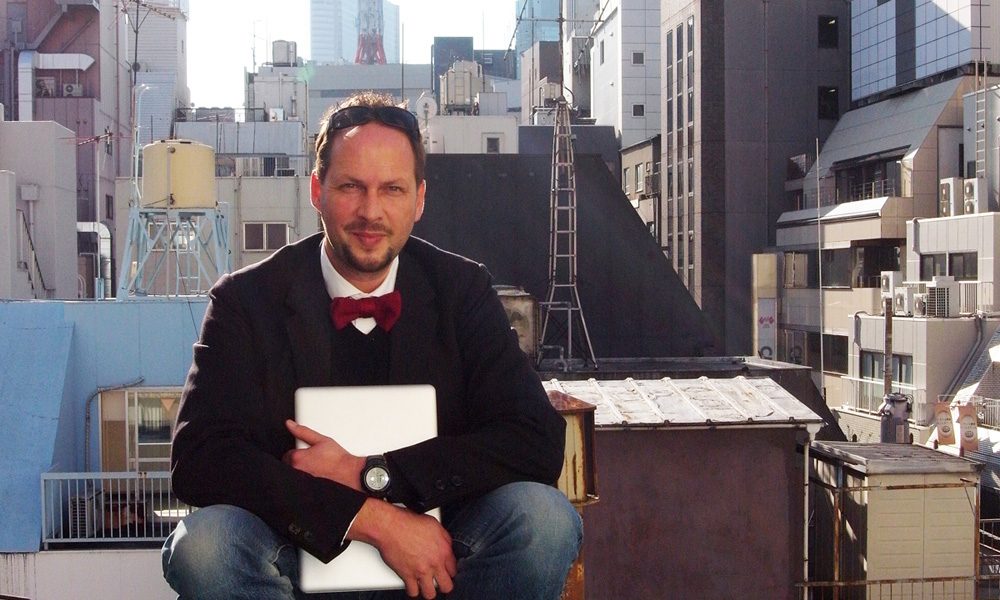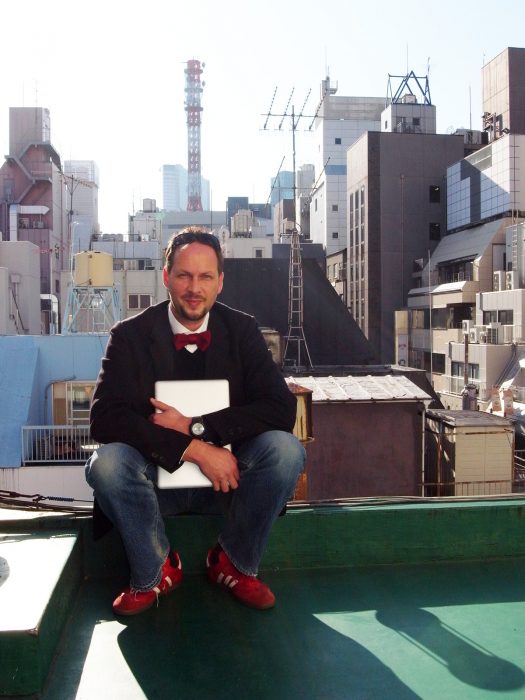
Words to Live by: Web designer & photographer Peter Brune
Interview by Judit Kawaguchi
Good manners are the most important thing in the world. That’s what’s so great about Japan! The Japanese say little but mean a lot. They never want to bother anyone and always put others first.
To see the real picture, always look for the details. When you encounter Tokyo, you think it is chaotic—endless concrete mushrooms on top of each other. But once you see one tiny mushroom locally, it is so lovely. You look at a small house with a grandma and a cat and some little flowers; it is idyllic, peaceful and that’s Tokyo for me. I see the macroview as a photographer, but I rest my eyes on the microcosmos.
Optimize yourself, your life and your actions. Whatever I am, it’s on the sites I design. “Yattemiru” is the key word: Give it a try! My job is to encode one’s essence.
To think positively, we need lovely stories and happy endings. Every morning I watch NHK TV’s “Ohio Nippon” (“Good morning, Japan”) or “NHK Zenkoku News” (“All around Japan News”). They show human-interest stories, like some cute ojiichan (grandpa) growing pumpkins. Everyone’s working and feeling good. It’s all about world peace, and not only is the content happy, but the aesthetics is also very similar to what I used to see in my childhood.
A website is like a meishi (business card): you spend money making it, yet nobody pays you for it.
Getting sick, to the point of almost dying, is sometimes necessary to save us from ourselves. Before I fell sick, I couldn’t say no. I was like a typical Japanese person, always thinking of others only and accepting any amount of work, even with impossible deadlines. I was taking painkillers for my stomach for years, until one day I almost bled to death from holes in my belly! Almost dying made me realize that I was killing myself. Now I’m much better with my time management.
The days when homepages made a profit are over. Websites should not contain ads, as they’re not tools for moneymaking but spaces for the free flow of information. “Free” is the keyword.
East Germany was an island nation, just like Japan. Inside it we were safe; if we accepted not to talk about politics. We all got free milk and a free education, same as in Japan.
If you move to a new country, it’s your responsibility to overcome the language barrier. In 1997, when I was 33, I studied Japanese for 2 years because I wanted to live here.
In Japan, short answers go a long way. Here minimalism in communication matters: “Yes, yes,” it’s enough to repeat that one word.
The emancipation of women freed them to work even more than their mothers used to: Not only they have to labor at home but outside, too. In the past, German women’s role was limited to Kinder (kids), Kirche (church) and Küche (kitchen). Socialism changed all that by adding Arbeit (work) to it. My mom was brainwashed by the state propaganda that women didn’t need a husband and children didn’t need a father. That meant I was alone all the time, as my mom worked 12 hours a day at her job. I was free but she was working like a slave.
Living alone doesn’t mean one feels alone. When I was single, I never felt lonely. I chatted. I e-mailed, I Skyped. I had friends all over the world via the net. I still do, but luckily now I also have a partner at home.
If you live in Japan long enough, it’s easy to “turn Japanese”. I behave like a Japanese, even when I speak other languages. “ Excuse, may I disturb you?” I ask in German. It’s weird, as Germans never ask that. I feel Japanese. I’m surprised when I see my face in the mirror. It’s good; that’s integration.
Not being stupid is a present from God. I have that, thank heaven. Everything was so easy for me. On top of that, luckily I grew up in a communist country where I could be free. Sure, within borders, but this is exactly why it was good for a child. The walls protected me from the stress of being or pretending to be successful, to always present myself as “I’m the best, give me a job”, even if I were not. Kids who grow up in capitalism feel such pressure to succeed, that many get tired out even before they reach the age to really get going.
Once you find the spot that’s really comfortable, why change places? Nothing can make me move from Japan, not even the frequent earthquakes. A bit of a shake here and there is fun. When the earth shakes, shake with it. It’s so moving.

Japanese business style is classy and fun. With clients, we don’t talk much about work. With one, the first time we met, we just chatted; the second time, we drank beer, ate sausages, and said, “Let’s do it!” We had no contract and the price was a ballpark estimate from me. Japanese are all about trust and quality.
For most Japanese, the concept of overtime is abnormal. Think of a grandma and grandpa a long time ago, working all day and never complaining. Japanese are still like that and this is why we have superior products and services here. The majority of Japanese businesses are small family operations, with shokunin (craftspeople), who work and live in their own world, and not for profit, but for quality. They are very satisfied as they take pride in making super-good quality products.
One can feel at home in a very foreign place. I don’ feel like a foreigner in Japan. Everything is natsukashii (brings back good memories), because what I see in Japan is something already lost in East Germany. I’m reborn here.
More at piichi.com and peterbrune.com
A version of this interview appeared in The Japan Times on December 24, 2009
http://www.japantimes.co.jp/life/2009/12/24/people/web-designer-peter-brune/
This QuoteA website is like a meishi ... — Peter Brune